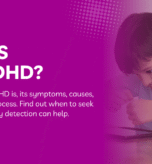In today’s fast-paced and often overwhelming world, it’s easy to miss the early warning signs of poor mental health. While everyone experiences stress or sadness occasionally, ongoing emotional and psychological struggles may indicate a deeper issue. Recognizing the signs early can lead to quicker support and recovery.
🧠 Why Recognizing the Signs Matters
Mental health affects how we think, feel, and act. It also influences how we handle stress, relate to others, and make choices. Identifying the signs of poor mental health can help prevent more serious problems from developing and improve quality of life through timely intervention.
🔍 Common Signs of Poor Mental Health
1. Persistent Sadness or Depression
Feeling down occasionally is normal. However, if sadness lingers for weeks, it may be a sign of depression. This can include:
- Hopelessness or helplessness
- Loss of interest in activities you once enjoyed
- Crying spells without clear reason
2. Extreme Mood Changes
Sudden and intense shifts in mood — such as going from extreme happiness to deep sadness or anger — may indicate an underlying mental health issue like bipolar disorder.
3. Withdrawal from Social Activities
Avoiding friends, family, or regular activities can be a red flag. Isolation often accompanies conditions like depression, anxiety, or trauma.
4. Changes in Sleep Patterns
Sleep is closely tied to mental health. Look for:
- Insomnia or sleeping too much
- Frequent nightmares or restless sleep
- Trouble falling or staying asleep
5. Fatigue and Low Energy
Chronic exhaustion or lack of motivation, even after proper rest, could point to mental health challenges such as depression or burnout.
6. Difficulty Concentrating or Making Decisions
Poor focus, memory issues, or feeling mentally foggy can disrupt work and daily life. These symptoms are often seen in anxiety, ADHD, and depression.
7. Feelings of Guilt or Worthlessness
Constant self-criticism or feeling like a burden to others may indicate poor mental health. These thoughts can be deeply harmful if left unaddressed.
8. Changes in Appetite or Weight
Significant weight loss or gain, or a noticeable shift in eating habits, can reflect emotional distress or an eating disorder.
9. Substance Use to Cope
Relying on alcohol, drugs, or even excessive caffeine or food to manage feelings can mask deeper mental health issues.
10. Thoughts of Self-Harm or Suicide
If you or someone you know is experiencing thoughts of self-harm or suicide, it’s critical to seek help immediately. Call 988 or a local crisis line to get urgent support.
👥 When to Seek Help
If you notice several of these signs in yourself or someone else lasting for more than two weeks, it may be time to reach out for professional support. Mental health conditions are treatable, and early intervention leads to better outcomes.
You are not alone — and help is available. Whether through therapy, support groups, medication, or holistic care, there are many paths to healing.
📞 Get Help Now
If you are in New Hampshire and need immediate support, call the Rapid Response Access Point at 1-833-710-6477 or dial 988 for the national crisis hotline.
For ongoing support, connect with a licensed provider through NHBehavioral.com and find the right care for you or your loved ones.
Your mental health matters — recognizing the signs is the first step to recovery. 🌱




